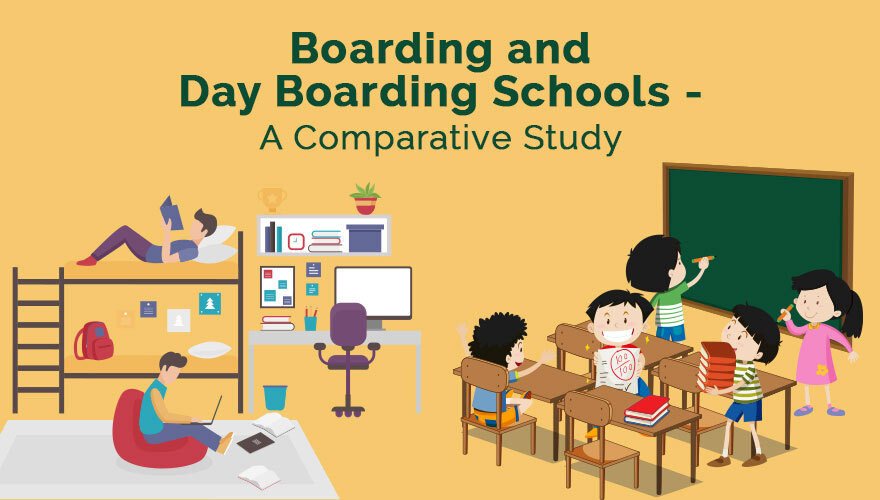
Boarding and Day Boarding Schools – A Comparative Study
Every parent wants to ensure their children receive the highest possible quality of education. Regarding deciding, two types of schools promise to provide all-round development and growth. Furthermore, they provide working parents with the ideal solution to educate their children and keep them occupied. These two options are boarding or residential schools and day boarding schools.
While both options are great, you need to understand their differences to make your choice. So keep scrolling to learn the differences and similarities to make an informed decision.
Living on Campus V/s Staying Back for a Few Extra Hours
Boarding schools or residential schools have hostel facilities where students live on campus. The students are provided formal education as they live on the premises with other students. They share rooms with other children their age and return home during holidays, such as summer vacations or semester breaks. Students study and live in the school with their administrators and teachers; hence, help is always available when they are stuck completing an assignment or project. The primary goal of a boarding school in Siliguri is to provide students with a nurturing and learning environment so they can reach their full potential.
On the other hand, day boarding schools are attended by students during the day and return to their parents in the evening. Students in this type of school remain on campus for extended hours after regular school hours. They are provided with nutritious meals and can even participate in various after-school activities. While they do not stay overnight, they can take advantage of personalized attention and clear their academic doubts. In addition, extended school hours can be utilized to finish homework and projects so that when they go home to their families, they can spend quality time engaging in leisure activities.
So, day boarding schools allow space for students on the campus after regular school hours but do not provide a bedroom like boarding schools. Many working parents prefer to send their children to day boarding schools because there’s security and safety. In addition, parents can complete their official tasks and pick up their children from school in the evening. For similar reasons, children also prefer sending their children to residential schools so they can grow to become independent individuals.
Ultimately, the choice depends on your preference because both options seem ideal for imparting quality education. You can continue reading to learn more about these school types.
The Cost
Typically, the cost of boarding schools is higher than day boarding schools. Children live on the premises and are provided bedding and lodging in the former. They are served nutritious meals. There are doctors on campus to help them if they fall ill. Also, the campus has CCTV surveillance, and there are several staff to assist the children whenever they find themselves in need of adult guidance and supervision. Furthermore, you don’t need to send your child to additional activities or tuition classes. Everything is taken care of by the school.
The residential school campus will typically have sporting fields for football, basketball, or lawn tennis. In addition, they will have space for other activities like singing, dancing, art & craft, etc. So, the cost may not seem that exorbitant when you calculate all of these and how much you are saving without having to send your child to individual classes.
On the other hand, a day boarding school in Siliguri costs less than a residential school because your child is not staying overnight. However, children get all the facilities like teacher assistance, extracurricular activities, etc.
Before making your decision, you need to sit down and make a financial plan. Then, talk to the schools and determine which option fits your budget the best.
Punctuality and Discipline
Both schools teach children time management and discipline. While on campus, children must follow a few sets of rules that they cannot break. They must abide by the regulations of the educational facility and respect them. The students are expected to work on a fixed timeline, making them responsible individuals as they grow up.
Full V/s Semi-independence
Boarding school children grow up fiercely independent because they have to care for themselves when living on the school campus. They take care of their belongings, complete regular chores, and learn how to overcome obstacles. As a result, their problem-solving skills are boosted, and they can adapt to any situation. In addition, they can adjust to varied living conditions because they share their room with other kids.
On the other hand, day boarding schools exert freedom but not entirely because children return home to their families. While staying on campus for an extended time, they look after themselves and have to take care of their belongings. They become accustomed to staying away from home for more hours than day schoolers. However, a complete sense of freedom isn’t exerted, and they might need a bit more help when it comes to doing everything on their own. But parents can take the responsibility of letting children complete their tasks at home so they can become confident individuals when they grow up.
The Bottom Line
Both boarding and day boarding schools are great options for giving your child the best possible education. They both create learning environments where children can thrive. The primary difference is living on the campus V/s returning home in the evening. Therefore, the choice boils down to your preference and budget.
Before deciding, do not forget to talk to your child to understand their preference and make an appointment with an education counselor. You can clear your doubts and have the clarity and confidence you need to make a decision.

